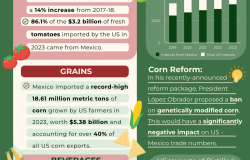Better Late than Never: Lessons Learned from Mexican Truck Drivers in the United States
On Friday, January 9, 2015, the United States Department of Transportation made an important announcement that has not received the recognition it deserves: the Department of Transportation will begin to process applications of Mexican land freight trucking companies wishing to provide international services in the United States. This topic is worth remembering for the lessons it leaves us with.

The opening of the United States to freight trucking companies from Mexico will change the border and its competitiveness.
Mexico must always demand the rule of law and compliance with commitments.
On Friday, January 9, 2015, the United States Department of Transportation made an important announcement that has not received the recognition it deserves: the Department of Transportation will begin to process applications of Mexican land freight trucking companies wishing to provide international services in the United States.
This announcement ends the pilot program that was established as a palliative measure in response to the longstanding dispute with Mexico. This topic is worth remembering for the lessons it leaves us with.
The negotiation for the North American Free Trade Agreement is perhaps Mexico’s most ambitious initiative in its economic history. Its main virtue is to ensure not only an opening with wide coverage, but the certainty that the opening is irreversible. As a result, the economic landscape has been radically modified and the country has become an industrial power in the world. In the manufacturing sector, Mexico has a market share of 12.8 percent on imports in the United States; only surpassed by China. Before the treaty, the market share stood below 6 percent.
NAFTA enabled Mexico’s commercial and industrial policies to transition from being policies based on interests to policies based on principles. One of the most important was the adoption of the non-discriminatory national treatment principle. The three member countries committed themselves to treat goods, investors and suppliers of services from the other two parties as if they were national. The principle of national treatment would be applied to all sectors and all people that had not been exempted from it. At that time (24 years ago), the principle represented a high level of ambition, since it implied that the United States would give the same treatment to Mexicans and Canadians that it would to Americans and vice versa. This was the first time that a treaty involving a developing country demanded a generalized non-discriminatory treatment.
For Mexico, this inclusion was historic: it would have been unacceptable for the United States to not consider goods and services delivered by Mexicans as equals.
The inclusion of a trucking agreement in the negotiation was controversial from the start, due to the pressure that the government of the United States received from the American Trucking Association. The trucking industry sector in Mexico opposed to it with the objective of keeping themselves free from competition. The Mexican government agreed on the opening of the sector, convinced of the crucial competitive importance of improving the transportation system.
The first phase of the agreement, involving the Border States, was scheduled for December 17, 1995. The governments of both countries tirelessly worked to have the necessary inspections on time. One week before, Federico Pena, the Director for the U.S. Department of Transportation at the time, conducted site visits to various points on the border to ensure everything was ready.
However, two days before December 17th, U.S. trade representative Mickey Kantor stated that the United States would not meet its obligations and that the expansion of the Mexican trucking sector into the United States would be postponed indefinitely. This was the result of growing pressure from the American truck driving union (Teamsters). This decision damaged the credibility of the United States in relation to the rule of law and respect for the commitments they had made. This ignited an erosion of their political and commercial interests that is, perhaps to date, being held hostage by powerful interest groups.
The cabinet of that time, in light of the huge loan that the Clinton Administration had given to Mexico for the 1995 crisis, decided not to call for a solution in a disputes panel. Today, it is clear that if they had conducted a disputes panel, the issue would have been resolved in a matter of months, and other conflicts, such as the sugar dispute, could have been easily avoided. In the year 2000, the Minister of Trade and Industrial Development, Herminio Blanco, requested a panel to finally have this issue resolved.
Once established, the panel ruled in favor of Mexico in 2001 (where Mexico should not only have access into the United States but that they should be treated as any other national entity) Mexico was also authorized to take any necessary actions against the United States. The Mexican government at that time decided not to retaliate due to the possibility of an immigration agreement; no reprisals were taken until 2009.
The events that followed show how Mexico should always demand the rule of law and seek compliance with the established commitments. The protection of principles and basic rights is essential and not negotiable. It was not acceptable that the Mexican trucks were discriminated against for being Mexican. It is only just that Mexican trucking companies be judged out of their own merits.
Once the reprisals were taken in 2009, the U.S. government had, by a powerful incentive, to comply with the agreements set forth by NAFTA. Therefore, the U.S. government designed a pilot program to test whether trucks and Mexican drivers were safe enough to operate on their roads.
The announcement on January 9, 2015 (which avoids a possible round of reprisals) and the report that the Department of Transportation delivered to the U.S. Congress proved that the Mexican trucks that have operated in the United States are safe; in fact, they are safer than most American trucks (http://www.fmcsa.dot.gov/mission/policy/united-states-mexico-cross-border-long-haul-trucking-pilot-program-report-congress).
The United States opening up to international freight trucks from Mexico will change the border and its competitiveness, not overnight, but rather in the medium term when there are viable alternatives to customs agents. However, without a doubt, this announcement is relevant because of the lessons it teaches: the demand for one’s rights is an obligation, not just a privilege; requiring compliance with rights is a basic trait needed for a civilized coexistence; instances of arbitration and litigation are indispensable for the smaller country; and reprisals must only be used to seek compliance with established commitments.
Many people in the Mexican government participated for many years in the settlement of this dispute. An ex-government official, Karen Antebi, deserves recognition from all of us.
This article was originally published on El Universal and was translated into English by Mexico Institute Staff.
About the Author
Luis de la Calle
Managing Director, De La Calle, Madrazo & Mancera and former Undersecretary, Ministry of Economy, Mexico

Mexico Institute
The Mexico Institute seeks to improve understanding, communication, and cooperation between Mexico and the United States by promoting original research, encouraging public discussion, and proposing policy options for enhancing the bilateral relationship. A binational Advisory Board, chaired by Luis Téllez and Earl Anthony Wayne, oversees the work of the Mexico Institute. Read more










